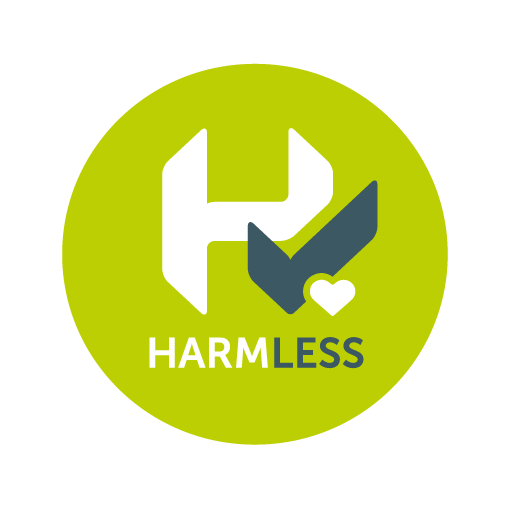
Emergency Response: How to Administer Head Injury First Aid
Share
Head injuries can be a serious cause for concern. Therefore, it is good to have a basic understanding of how to respond promptly and effectively so you know when it is appropriate to seek professional medical care. Whether it's a sports-related accident, a fall, or any other incident, head injuries can range from mild to severe, potentially leading to long-term effects if not handled correctly. In this guide, we'll explore the basics of head injury assessment, treatment, and first aid guidelines for first aiders, while also introducing products from harmless.nz that can aid in minimising the extent of the initial injury.
Head Injury Assessment

Recognising the Signs
The first step in administering head injury first aid is recognising the signs of a head injury. These can vary in severity, but some common symptoms include:
1. Headache: A persistent and severe headache can be an early sign of a head injury.
2. Nausea or Vomiting: Frequent or persistent nausea or vomiting may indicate a head or brain injury.
3. Confusion: Disorientation, memory problems, or difficulty concentrating can be warning signs. The injured person may appear dazed.
4. Loss of Consciousness: Brief or Loss aversion of consciousness is a clear indicator of a head injury. Even momentary loss of consciousness should be taken seriously.
5. Bleeding: Any visible bleeding from the head or ears should be taken seriously.
6. Unequal Pupils: If one pupil appears larger or reacts differently than the other, seek immediate medical attention as this could indicate increased intracranial pressure.
7. Difficulty speaking or slurred speech: A potential sign of brain injury.
Assessing the Situation
Once you recognise these signs, it's essential to assess the situation:
1. Safety First: Ensure the safety of the injured person and yourself. Remove them from any ongoing danger.
2. Check for Responsiveness: Gently tap the person and ask if they are okay. If they are unresponsive, call 111 for help immediately.
3. Stabilise the Head and Neck: If the person is conscious but has a head or neck injury, avoid moving them unless it's necessary to prevent further harm.
4. Call for Medical Assistance: If the injury is severe, or if there's any doubt about its severity, call 111 for an ambulance.
Head Injury Treatment

Basic First Aid
While waiting for medical professionals to arrive, you can provide basic first aid for head injuries:
1. Keep the Person Calm: If the injured person is conscious, encourage them to remain as still and calm as possible.
2. Control Bleeding: If there's visible bleeding, apply gentle pressure with a clean cloth or sterile dressing. Do not apply pressure if you suspect a skull fracture.
3. Elevate the Head: If there are no suspected neck injuries, elevate the head slightly to reduce swelling.
4. Apply Cold Compress: You can apply a cold compress to the injured area to further reduce swelling and discomfort.
5. Monitor Vital Signs: Keep a close eye on the person's breathing and consciousness levels until help arrives.
Head Injury Guidelines

Seek Medical Evaluation
It's crucial to understand that head injuries can have hidden complications. Even if the injured person appears fine, they should seek medical evaluation as soon as possible after the head injury. Medical professionals can perform necessary tests, such as CT scans, to rule out internal injuries. Most brain injuries aren’t visible to the naked eye and this is why professional medical assistance should be sought for most head injuries.
Head Injury Effects

The effects of a head injury can be life-altering, and it's essential to be aware of the potential consequences. Early intervention, appropriate medical care, and support networks can make a significant difference in the recovery process.
Head Injury Long-Term Effects
Head injuries can have both short-term and long-term effects. Some of the potential long-term consequences include:
1. Post-Concussion Syndrome: This can lead to persistent headaches, memory problems, and mood changes.
2. Stroke from Head Injury: A head injury may increase the risk of stroke, which can occur days or even weeks later.
3. Cognitive Impairment: Long-term cognitive issues, such as difficulty with memory and concentration, can develop.
4. Emotional and Psychological Impact: Anxiety, depression, and other emotional challenges can arise.
Head Injury Support in New Zealand

Accessing Help and Resources
In New Zealand, there are several avenues for support for individuals dealing with head injuries and their families:
1. New Zealand Brain Injury Association (NZBIA): NZBIA offers resources, support groups, and information for individuals affected by brain injuries.
2. Head Injury Society of New Zealand (HISNZ): HISNZ is a medical leader in helping people suffering from life-threatening injuries get the support and information they need.
3.ABI Rehabilitation: ABI (Acquired Brain Injury) Rehabilitation provides specialist residential and community based rehabilitation for stroke victims and people with traumatic brain injuries.
4. ACC (Accident Compensation Corporation): ACC provides support for those who have suffered head injuries as a result of an accident. This can include financial assistance for rehabilitation and medical costs.
5. Local Support Groups: Many regions in New Zealand have local support groups that provide a community of understanding individuals who have experienced similar challenges.
Conclusion
In emergencies like head injuries, knowing how to administer first aid and access the right support is crucial. Remember that this is a brief guide, and for more comprehensive information, consult healthcare professionals or specialised organisations like the New Zealand Brain Injury Association (NZBIA). By taking prompt action and seeking help when needed, you can improve the chances of a positive outcome for those affected by head injuries in New Zealand.
Administering head injury first aid is a valuable skill that can potentially save lives. Stay prepared, stay informed, and prioritise safety in all situations.
